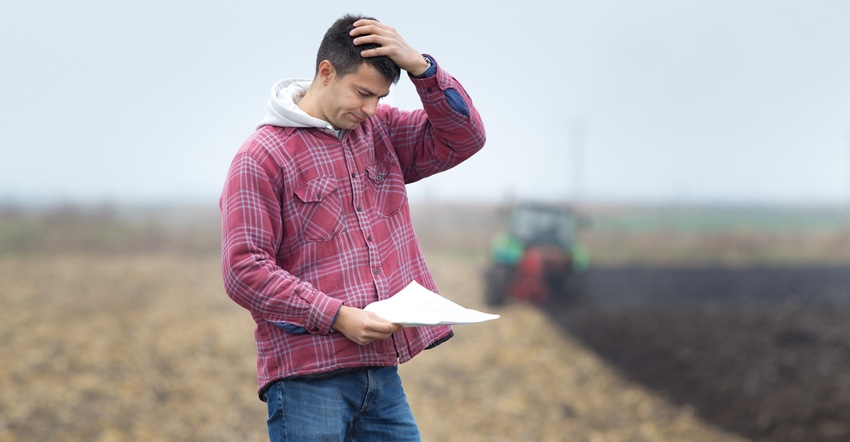March 18, 2021

Boy, what a difference a year makes.
At this time last year, our lives were turned upside down by the sudden shutdown brought on by the coronavirus pandemic. I thought the whole thing was overblown, or at best would cause only a temporary inconvenience to my life. Of course, I was very wrong.
With cases going down and vaccines becoming more available, I’m feeling more confident each day that the pandemic might be winding down.
It’s been a stressful year for everyone, and this pandemic has really shined a light on mental health, even in agriculture. For that I’m grateful, because no one deserves to feel pain alone.
When the American Soybean Association formed a COVID-19 task force last year, it surveyed its members and asked them about the effects of the pandemic on their lives and livelihoods.
Wendy Brannen expected to hear stories of economic hardship, growing season problems or worries over trade. But it was concerns over family and worker mental health that concerned growers the most.
“So this is where ASA really got involved in that topic,” says Brannen, senior director of marketing and communications for ASA. She spoke during the recent Commodity Classic virtual event.
Last May, ASA launched a mental health awareness campaign on social media — #SoyHelp — and partnered with other farm groups and Farm Credit to help spread the word of the campaign.
I’ve covered several webinars and talks over the past year on farmer mental health, but this talk at Commodity Classic was useful because it gave practical advice on how to recognize mental health issues and how to talk about it with others.
“This can be a difficult conservation,” says Eric Karbowski, a behavioral health educator with Michigan State University. He is a former executive director of a local commission on aging and has been involved in the public mental health space for a while. He’s also married into a farm family and has experienced the loss of close friends by suicide.
The first sign to dealing with a problem is recognizing it in the first place. You might feel anxious, angry, sad or bitter. There are also some physical signs, Karbowski says. You might feel headaches, stomachaches, back pain, or even have high blood pressure, high blood sugar or a racing heart.
Prolonged stress will lead to certain actions. You might have trouble sleeping or sleeping too much, overeating or not eating, drinking more alcohol or using drugs, or just losing your temper more quickly.
Karbowski says that he eats more when he feels stressed out.
It’s easy to tell employees to talk about their problems with you when they’re stressed out, but Karbowski says there are ways to help them open up, too. The first thing, he says, is to listen. “And I always encourage people to be in that moment; try to get rid of some of your distractions, put your cellphone down,” he says.
Also, ask open-ended questions.
You may ask an employee, “Are you feeling OK?” They might answer with a simple yes or no, and might not go beyond that. A more open-ended question would be, “How do you feel about that? Tell me what’s bothering you.” This might engage the other person to tell you more about what’s going on with them.
Here’s another example:
“Are you ready to make a decision?” A more open-ended way of asking the same question would be, “What is holding you back from making a decision? What else do you need to help you make a decision?”
A third example:
“Do you need some help?” A more open-ended way of asking the same question would be, “How do you hope I might be able to help you?”
It’s also good to know the eight dimensions of wellness, Karbowski says, because what can work for one person to relieve stress might not work for another person.
Here are the eight dimensions of wellness:
1. Physical. Any form of exercise can relieve stress.
2. Intellectual. Some activities can engage your mind, such as reading, journaling or just doing a jigsaw puzzle.
3. Financial. Use money management resources to handle finances better.
4. Environmental. Spend non-work time in nature and green spaces.
5. Spiritual. Connect yourself spiritually through meditation, religion or through prayer.
6. Social. Stay connected with family and friends.
7. Occupational. Allow yourself time to recharge and establish healthy boundaries.
8. Emotional. Detach yourself temporarily from stressors, using relaxation techniques and reframing your own thoughts.
These are all good, practical ways to recognize and deal with stress and mental health. I know the growing season is coming, and it’s about to get really busy, but take time for yourself and talk to someone if you’re not feeling well.
And if you know someone who might need help, look for the following warning signs: talking or writing about suicide or death; feeling hopeless; giving away prized possessions; saying goodbyes; isolation; loss of interest; and sudden mood changes.
Don’t be afraid to ask a friend or employee if they’re not feeling well. Ask them directly and listen to them closely.
Check out the Farm Progress mental health page for additional tips for dealing with mental health. And if you need immediate help, or know someone else who does, call the National Suicide Prevention Lifeline at 1-800-273-TALK.
Read more about:
Covid 19You May Also Like




